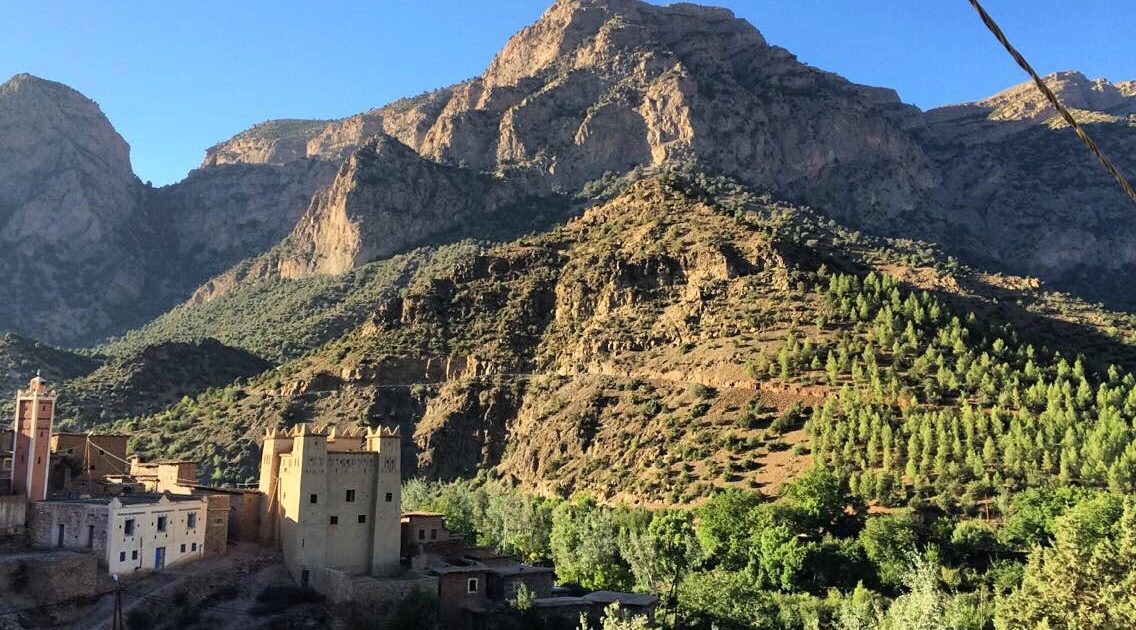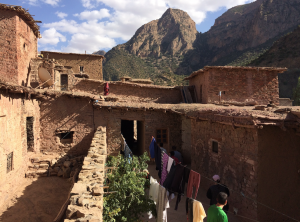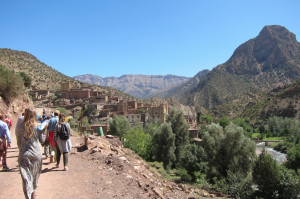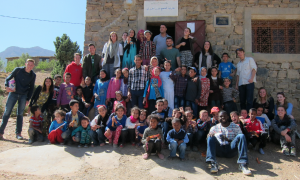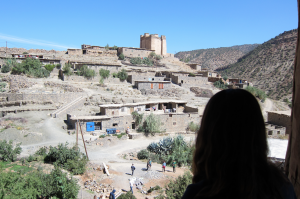A trek to knowledge: the High Atlas
Imagine lying on a rooftop, in pitch black, gazing at the stars. Your zenith is the Milky Way galaxy, a visual cloud of clustered stars with a faint color of silver and deep purple. This mesmerizing sight was my view for two nights in the High Atlas Mountains of Morocco, the largest mountain range in Africa.
At an elevation of over 8,000 feet, I spent three days in the agricultural village of Zawiyat Ahansal feasting on traditional food made of local produce, teaching Amazigh children, hiking, and dancing with Atlas Ahidous dancers.
Zawiyat Ahansal consists of four smaller villages: Amezray, Aguddim, Taghia and Tighanimin. Founded in the 13th century by a Sufi Islamic scholar named Sidi Said Ahansal, historically, pilgrims would travel here to ask for blessings on the grave of Saint Ahansal. About 15,000 native Amazigh people live here and predominantly speak Tamazight.
My favorite aspect of the trip was volunteering with the Atlas Cultural Foundation, a U.S. based NGO and Les Amis de Amezray, a French NGO, both of which focus on Amazigh cultural preservation, community health, education and environment.
Around 9 a.m. my group went on the most beautiful trek to the school in a neighboring village. The lush river roared above the rocks and the sun crept over the vast mountain range. Much of the trail was unpaved over jagged rocks, and yet children take this route to school every day. This small trek reminded me of a Netflix documentary I saw, which depicts children going to school around the world. Some of them walk for hours upon hours everyday through rigorous terrain to receive instruction.
I witnessed firsthand the universality of education and how it is translated into a multiplicity of languages. I believe it is incredibly important around the globe to enlighten and empower the coming generations.
At the school, we rotated with groups of kids aged five to fifteen. Some of us taught math, English vocabulary, grammar, art, etc. This school was created by ACF and the Amezray Foundation as a tutoring center for local children. They attend the two government schools in the villages and are taught in Tamazight for a portion of the day then migrate to the tutoring center to receive additional instruction. I was surprised to find that these kids, living in a rural village about 50 miles from the nearest city knew more English than many adults I’ve met in Rabat, the capital. Many of the kids have learned English through partnerships with international organizations and volunteers who help year round.
Much reform has been made in the education system in Zawiyat Ahansal. ACF’s program manager told me that prior to 2015, only one government school existed in all four of the villages. Many children would drop out because of the long trek, financial strains, lack of emphasis on the importance of education by parents, or the preference to keep girls to at home.
There has been a shift in the value and emphasis placed on education through push from NGOs, and a secondary and dormitory school are currently under construction, which allow the children to stay at the school all week, then return home on the weekends.
After we finished teaching, the children gathered on the porch of the school and their eyes lit up as we handed out candy and snacks to them.
Seeing their smiling faces and participating in the education in the lives of these Moroccan children makes grateful to have made even the smallest impact on their lives. Even if I didn’t, this experience widened my perspective on the education system in rural villages and the successful impact international NGOs can have when partnered with local organizations.
Zawiyat Ahansal is considered the second poorest region in all of Morocco, but i do not believe they are poor. Their lack of financial assets are compensated by rich in family values, sense of community, and self-sustainability–tribal principles–that have led this village to prosper for hundreds of years. What I’ve realized is that some of the “poorest” people are the happiest people.
This trip was extremely humbling and made me realize how privileged I am to be in a position where I have the opportunity to travel and educate others. Now that I am back in Rabat, I teach English at a local tutoring center once a week with my colleagues. Rather than creating a classroom environment where we lecture the whole time and they listen, we’ve created a language exchange where we learn new Arabic words as they learn new English words. By the end of the semester, I hope to have helped them reach their language goals, as I hope to with mine.
Erum Jaffrey is a senior majoring in international relations. Her column runs every other Friday.

